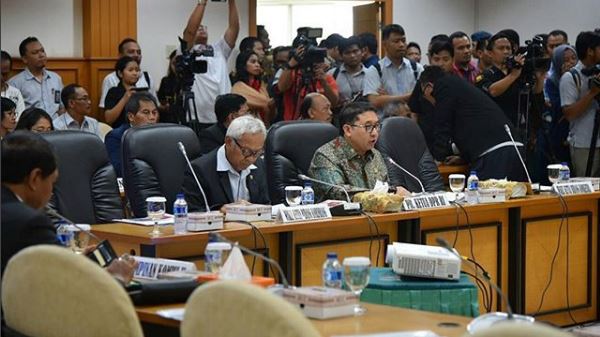While rights activists in Indonesia have been seriously concerned about, and building opposition to, a highly repressive revision to the country’s criminal code that is currently working its way through the House of Representatives (DPR), lawmakers managed to push through another piece of legislation that critics say represents a serious threat to the country’s democracy.
Yesterday, the DPR ratified Bill No 17 of 2014 concerning the MPR (People’s Legislative Council), DPR, DPD (Regional Representatives Council) and DPRD (Regional House of Representatives), which has been shortened in the Indonesian media as UU MD3. The bill contains a plethora of new laws which covers every level of legislative body in the Indonesian government but there are several articles that critics say are especially dangerous.
One of those, article 122, gives the DPR’s Ethics Council (MKD) the power to take legal action against individuals, groups or legal entities that “degrade the honor of the DPR or DPR members”. As is typical in Indonesian legislation, what constitutes a “degredation” of honor is left undefined, leaving the door wide open for the law to be used to criminalize legitimate criticism of legislators.
House Speaker Bambang Soesatyo defended the article, saying that DPR members had the right to “defend their honor” just like members of any other profession. Also agreeing to the bill was Deputy House Speaker Fadli Zon, who just days earlier had criticized an article in the revised criminal code that would make insulting the president illegal for being undemocratic.
Criticism after the bill’s passage was harsh, with one of the strongest rebukes coming from Dahnil Anzar Simanjuntak, chairman of the Muhammadiyah Youth Leadership Center.
“For me UU MD3 will drag Indonesia into a dark era of democracy,” Dahnil said in a written statement on Tuesday as picked up by Kompas.
“It turns out that our politicians want to rule without restrictions, by complicating the legal process and obtaining impunity from criticism.”
In addition to article 122, Dahnil and other critics have taken aim at article 73, which allows the DPR to order the police to forcibly summon individuals for questioning as well as article 245 which requires investigators to get permission from either the president or the MKD in order to question DPR members about criminal cases (although this does not apply to corruption investigations).
The bill did not go through without internal opposition. The government and eight out of the 10 political parties agreed on UU MD3 while the United Development Party (PAN) and the National Democratic Party (Nasdem) abstained from discussion, with Nasdem members staging a walkout.
Hifdzil Alim, a researcher at Universitas Gajah Madah’s Center for Anti-Corruption Research, said that he was ready to file a Consitutional Court challenge to the bill, stating that the inability to criticize the DPR would lead to the “suffocation of civil society”.




